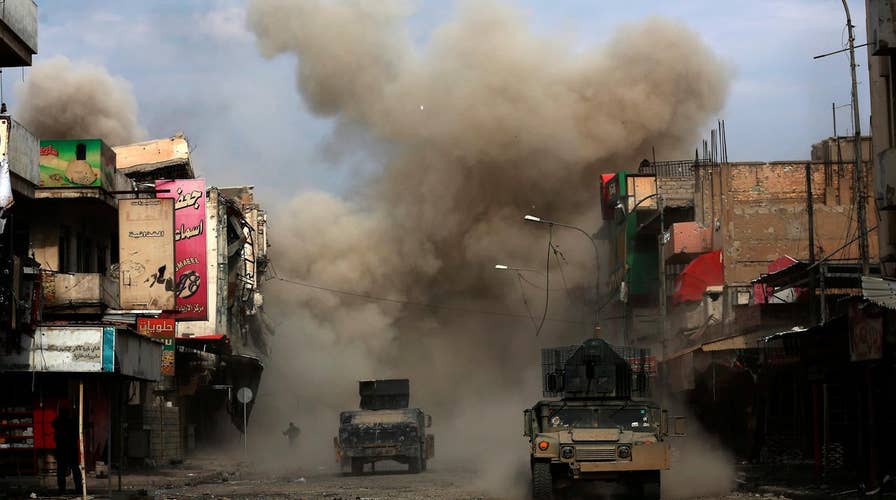One year ago, on March 14th, 2016, Congress embraced something more elusive than bi-partisanship: unanimity. The House of Representatives voted 393-0 to declare that ISIS was committing genocide against Christians, Yazidis, and other ethnic and religious minorities in Iraq and Syria.
Led by Representatives Jeff Fortenberry (R-NE) and Anna Eshoo (D-CA), the resolution was a lesson in complete cooperation on an issue that transcends politics.
A few days later, on March 17th, then-Secretary of State John Kerry followed suit, declaring that ISIS was committing genocide against Christians, Yazidis, and Shia Muslims. In July, the Senate concurred, also unanimously.
Such unanimity is rare in government.—and so are genocide designations by our State Department. Only two such declarations have ever been made, both for situations still ongoing – ISIS’ persecutions, and, in 2004, the Sudanese government’s massacres in Darfur.
Now a new Congress and a new Administration can act again-- to go beyond declarations to action.
A year ago, Christians and other religious minorities in Iraq and Syria were elated by the genocide designation. They hoped it would be followed by direct U.S. action to stabilize their communities through government aid.
They were wrong. Shockingly, far too often, that was not to be. Despite the declarations that the “crime of crimes” was being committed, there was, by and large, no special outreach or direct funding by the U.S. government to communities that suffered through the atrocities.
When I visited Iraq last May, I spoke with Christian and Yazidi genocide survivors, who had been overlooked in this terrible way. As I had tea with a group of Yazidis – living by an open sewer in the Erbil suburb of Ozal City – I asked them if they had received aid from the U.S. government or the United Nations.
They said: “No.” Only Iraqi Christians had helped them.
Then one of them thought hard and spoke up. “We did receive two kilos of lamb from the U.N .in the summer of 2014,” he said.
“And since then?” I asked.
“Nothing,” he responded. “Only the [local Catholic] Church has helped us.”
That Catholic Church– in the form of the Archdiocese of Erbil – is caring not only for Yazidis, but also for 12,000 families, the largest population of displaced Christians in Iraq. Despite that enormous responsibility, the Church has yet to receive money or anything else from the U.S. government or from the U.N.
At the U.S. Consulate in Erbil last spring, officials told me they prioritized “individual needs.” But as we spoke further, they admitted they did not think in terms of the groups targeted by the genocide at all. The only priority was meeting basic needs of any refugee There was no thought being given to supporting communities that faced genocide lest they disappear. It was the same story at the U.N. compound.
It doesn’t need to be this way.
This should not have been allowed to happen. But more importantly, this should not be allowed to continue.
The United States government could assist genocide survivors – as we have done over and over again for the past 100 years and more. Action is needed – the kind of action we took in Darfur a decade-and-a-half ago that resulted in more than $7 billion in aid being given to the people in that region, with almost $3 billion in direct assistance to Darfur via USAID.
Two weeks ago, I received a phone call from an archbishop in Iraq. He was hopeful. He told me that he recently had an excellent meeting with a U.S. official there and the attitude that excluded his community was changing.
He was optimistic that this would soon result in meaningful financial support for his shrinking flock – a flock that has lived as refugees for two-and-a-half years and is losing hope.
There is another reason for optimism, which I witnessed just before Christmas. I was in Iraq again, this time with Congressman Chris Smith (R-NJ), and he was committed to helping fix the aid situation.
We spoke with displaced Christians, UN and U.S. officials, and Church leaders. Congressman Smith wanted to know why communities like the Christians in Erbil were not getting U.S. and U.N. aid and what could be done about it.
Congress had not acted last year on Smith’s bill to help provide aid to these genocide survivors (H.R. 5961).
But based on our trip to Iraq, he – along with Representative Anna Eshoo (D-CA) – reintroduced an enhanced version of the bill this year. Known as the Iraq and Syria Genocide Emergency Relief and Accountability Act (H.R. 390), the proposed legislation would ensure that those who suffered genocide are not ignored in U.S. aid distribution.
The budget for 2017 is already in place, so the benefits of action taken now would be immediate. Going forward, until the situation for these communities stabilizes, the United States will continue to have the opportunity to play a major role in ensuring that religious and ethnic minorities from the region do not disappear. This can be done by continuing to provide funds in future years for the assistance of genocide targeted communities in Iraq and Syria.
Such actions would change the future of a devastated region. It would also be a step toward transcending the partisanship of politics at home.

